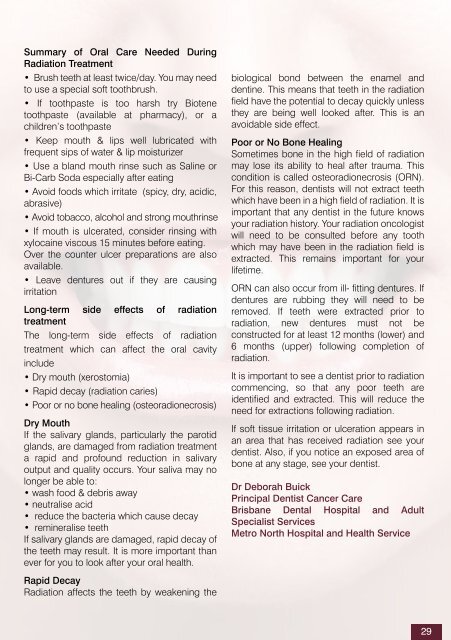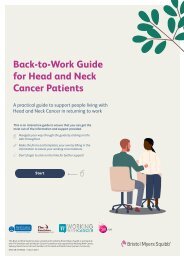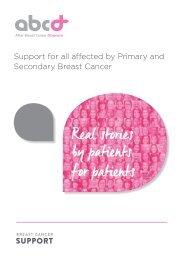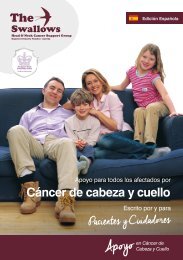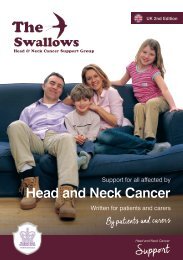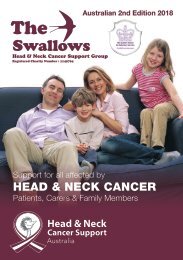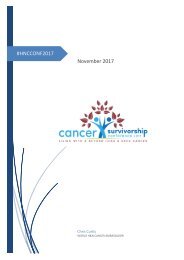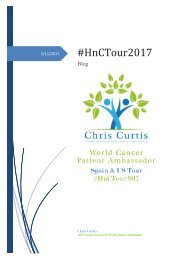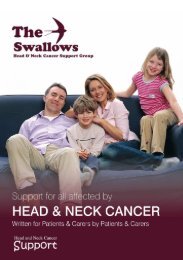The Swallows Australian Edition Magazine
You also want an ePaper? Increase the reach of your titles
YUMPU automatically turns print PDFs into web optimized ePapers that Google loves.
Summary of Oral Care Needed During<br />
Radiation Treatment<br />
• Brush teeth at least twice/day. You may need<br />
to use a special soft toothbrush.<br />
• If toothpaste is too harsh try Biotene<br />
toothpaste (available at pharmacy), or a<br />
children’s toothpaste<br />
• Keep mouth & lips well lubricated with<br />
frequent sips of water & lip moisturizer<br />
• Use a bland mouth rinse such as Saline or<br />
Bi-Carb Soda especially after eating<br />
• Avoid foods which irritate (spicy, dry, acidic,<br />
abrasive)<br />
• Avoid tobacco, alcohol and strong mouthrinse<br />
• If mouth is ulcerated, consider rinsing with<br />
xylocaine viscous 15 minutes before eating.<br />
Over the counter ulcer preparations are also<br />
available.<br />
• Leave dentures out if they are causing<br />
irritation<br />
Long-term side effects of radiation<br />
treatment<br />
<strong>The</strong> long-term side effects of radiation<br />
treatment which can affect the oral cavity<br />
include<br />
• Dry mouth (xerostomia)<br />
• Rapid decay (radiation caries)<br />
• Poor or no bone healing (osteoradionecrosis)<br />
Dry Mouth<br />
If the salivary glands, particularly the parotid<br />
glands, are damaged from radiation treatment<br />
a rapid and profound reduction in salivary<br />
output and quality occurs. Your saliva may no<br />
longer be able to:<br />
• wash food & debris away<br />
• neutralise acid<br />
• reduce the bacteria which cause decay<br />
• remineralise teeth<br />
If salivary glands are damaged, rapid decay of<br />
the teeth may result. It is more important than<br />
ever for you to look after your oral health.<br />
Rapid Decay<br />
Radiation affects the teeth by weakening the<br />
biological bond between the enamel and<br />
dentine. This means that teeth in the radiation<br />
field have the potential to decay quickly unless<br />
they are being well looked after. This is an<br />
avoidable side effect.<br />
Poor or No Bone Healing<br />
Sometimes bone in the high field of radiation<br />
may lose its ability to heal after trauma. This<br />
condition is called osteoradionecrosis (ORN).<br />
For this reason, dentists will not extract teeth<br />
which have been in a high field of radiation. It is<br />
important that any dentist in the future knows<br />
your radiation history. Your radiation oncologist<br />
will need to be consulted before any tooth<br />
which may have been in the radiation field is<br />
extracted. This remains important for your<br />
lifetime.<br />
ORN can also occur from ill- fitting dentures. If<br />
dentures are rubbing they will need to be<br />
removed. If teeth were extracted prior to<br />
radiation, new dentures must not be<br />
constructed for at least 12 months (lower) and<br />
6 months (upper) following completion of<br />
radiation.<br />
It is important to see a dentist prior to radiation<br />
commencing, so that any poor teeth are<br />
identified and extracted. This will reduce the<br />
need for extractions following radiation.<br />
If soft tissue irritation or ulceration appears in<br />
an area that has received radiation see your<br />
dentist. Also, if you notice an exposed area of<br />
bone at any stage, see your dentist.<br />
Dr Deborah Buick<br />
Principal Dentist Cancer Care<br />
Brisbane Dental Hospital and Adult<br />
Specialist Services<br />
Metro North Hospital and Health Service<br />
29


